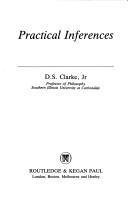| Listing 1 - 10 of 45 | << page >> |
Sort by
|
Book
Year: 1966 Publisher: London : Routledge & K. Paul,
Abstract | Keywords | Export | Availability | Bookmark
 Loading...
Loading...Choose an application
- Reference Manager
- EndNote
- RefWorks (Direct export to RefWorks)
Book
ISBN: 0892329114 9780892329113 Year: 1988 Volume: 7 Publisher: Greenwich, Conn. : Jai Press,
Abstract | Keywords | Export | Availability | Bookmark
 Loading...
Loading...Choose an application
- Reference Manager
- EndNote
- RefWorks (Direct export to RefWorks)
Econometrics --- Inference --- Econométrie --- Inférence (Logique) --- Econométrie --- Inférence (Logique)
Book
ISBN: 3700103158 Year: 1979 Volume: 12, 15 287, 358 Publisher: Wien Österreichische Akademie der Wissenschaften
Abstract | Keywords | Export | Availability | Bookmark
 Loading...
Loading...Choose an application
- Reference Manager
- EndNote
- RefWorks (Direct export to RefWorks)
Buddhist logic. --- Inference. --- Logique bouddhique --- Inférence (Logique)
Book
ISBN: 0674568818 Year: 1983 Volume: 6 Publisher: Cambridge, Mass. : Cambridge University Press,
Abstract | Keywords | Export | Availability | Bookmark
 Loading...
Loading...Choose an application
- Reference Manager
- EndNote
- RefWorks (Direct export to RefWorks)
Psycholinguistics --- Inference --- Consciousness --- Psycholinguistique --- Inférence (Logique) --- Conscience
Book
Year: 1978 Volume: v. 1 Publisher: Napoli : Bibliopolis,
Abstract | Keywords | Export | Availability | Bookmark
 Loading...
Loading...Choose an application
- Reference Manager
- EndNote
- RefWorks (Direct export to RefWorks)
Inference --- Logic --- Inference --- Inférence (Logique) --- Logique --- Inférence (Logique) --- Early works to 1800 --- Ouvrages avant 1800

ISBN: 0710204159 Year: 1985 Publisher: London Routledge
Abstract | Keywords | Export | Availability | Bookmark
 Loading...
Loading...Choose an application
- Reference Manager
- EndNote
- RefWorks (Direct export to RefWorks)
Inference --- Inférence (Logique) --- Ampliative induction --- Induction, Ampliative --- Inference (Logic) --- Reasoning --- Inference. --- Inférence (Logique)
Book
ISBN: 9780465097609 046509760X 9780465097616 9781543695274 9780141982410 Year: 2018 Publisher: New York : Basic Books,
Abstract | Keywords | Export | Availability | Bookmark
 Loading...
Loading...Choose an application
- Reference Manager
- EndNote
- RefWorks (Direct export to RefWorks)
"Everyone has heard the claim, "Correlation does not imply causation." What might sound like a reasonable dictum metastasized in the twentieth century into one of science's biggest obstacles, as a legion of researchers became unwilling to make the claim that one thing could cause another. Even two decades ago, asking a statistician a question like "Was it the aspirin that stopped my headache?" would have been like asking if he believed in voodoo, or at best a topic for conversation at a cocktail party rather than a legitimate target of scientific inquiry. Scientists were allowed to posit only that the probability that one thing was associated with another. This all changed with Judea Pearl, whose work on causality was not just a victory for common sense, but a revolution in the study of the world"--
Causation. --- Inference. --- Philosophy of nature --- Causation --- Inference --- Causalité --- Inférence. --- Causalité --- Inférence.
Book
ISBN: 9782849347492 2849347493 Year: 2023 Publisher: [Le Kremlin-Bicêtre] : Mare & Martin,
Abstract | Keywords | Export | Availability | Bookmark
 Loading...
Loading...Choose an application
- Reference Manager
- EndNote
- RefWorks (Direct export to RefWorks)
Le syllogisme a été défini par Aristote comme une activité de l'esprit permettant de déduire une conclusion de l'application d'une règle de droit aux faits. Les révolutionnaires ont espéré réduire le juge à n'être qu'une "bouche de la loi", l'acte de juger devenant une lecture de la règle légale. Mais cette analyse réduit le raisonnement judiciaire à une équation mathématique, ce qui est contestable. Au contraire, tout en assurant la sécurité juridique, le syllogisme judiciaire laisse au juge une liberté d'interprétation permettant l'évolution du droit. Il donne un cadre à la motivation des décisions de justice. Et il s'adapte au contrôle de proportionnalité "in concreto", comme à la justice prédictive.
Déduction (logique). --- Syllogisme. --- Inférence. --- Équité. --- Juges. --- Proportionnalité (droit). --- Justice prédictive.
Book
Year: 1971 Volume: v. 46 Publisher: Paris : Mouton,
Abstract | Keywords | Export | Availability | Bookmark
 Loading...
Loading...Choose an application
- Reference Manager
- EndNote
- RefWorks (Direct export to RefWorks)
Truth --- Inference --- Convention (Philosophy) --- Reasoning --- Vérité --- Inférence (Logique) --- Convention (Philosophie) --- Raisonnement
Book
ISBN: 0391007645 Year: 1978 Publisher: Sussex : Harvester Press,
Abstract | Keywords | Export | Availability | Bookmark
 Loading...
Loading...Choose an application
- Reference Manager
- EndNote
- RefWorks (Direct export to RefWorks)
Inference --- Semantics --- Inférence (Logique) --- Sémantique --- Mathematical models --- Modèles mathématiques
| Listing 1 - 10 of 45 | << page >> |
Sort by
|

 Search
Search Feedback
Feedback About UniCat
About UniCat  Help
Help News
News